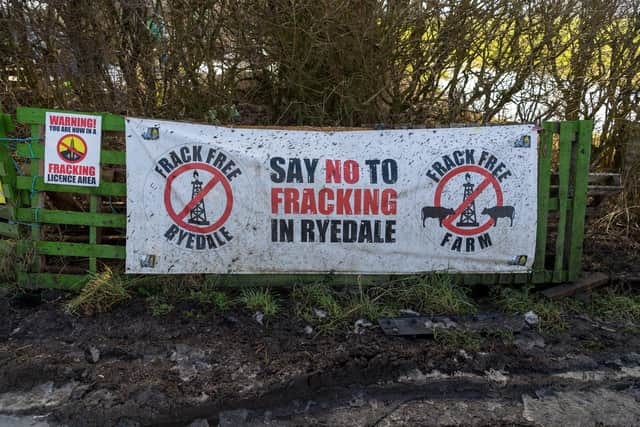Why we need a balanced view on tackling environmental issues - Paul Andrews
Fortunately fracking is an environmental issue. So, an opposition campaign was mounted and legal action was taken through crowdfunding.
The opposition, nationally as well as locally was effective and, thankfully the threat to our countryside, agriculture, tourism and other country businesses has been removed.
Advertisement
Hide AdAdvertisement
Hide AdFast forward a few years, and the same former gas well at Kirby Misperton is being re-purposed for the production of clean thermal energy.


A closed pipe system takes water down several miles under the earth where temperatures are higher than 90 degrees centigrade, and then circulated through insulated pipes for commercial and residential use.
The heat is transferred to the customer through heat exchange units which will not cost more than a new boiler. There will be no need to dig up the garden to fit a heat pump system.
Now, once the heat exchange unit is installed, the customer’s cost of heating is bound to be much less than the cost of burning gas or oil. So, this system is not only clean and environment friendly, but also more secure and cheaper than our existing fossil fuel heating systems. It has to be recommended.
Advertisement
Hide AdAdvertisement
Hide AdThe lesson is clear. We all know the impact of climate change. We’ve all seen the pictures of burning forests, melting ice and the erosion caused by rising sea levels.
However, most people live in the immediate present and will put their own interests ahead of the future of the planet. So, if people are to be persuaded to change, they must be shown that going green will be cheap.
Unfortunately we in the UK love to regulate. We impose ULEZ zones on whole towns and cities where the poorest can be worst affected, and the result is a reaction which feeds the interests of all those vested interests which have a stake in the petro-chemical industries.
This encourages weak politicians to abandon environmental targets – like the Prime Minister’s recent announcement on electric cars.
Advertisement
Hide AdAdvertisement
Hide AdIs there no room for compromise between the environmentalists and their opponents? Can’t we take a balanced view? I think we can.
First, it has to be accepted that there will always be a need for some fossil fuels. The objective should be to reduce this need to the lowest possible level.
So, whilst North Sea oil and gas reserves are decreasing, there is still enough for us at the present time and it is difficult to understand why it is necessary to licence new oil fields.
Secondly, there may well be areas of high pollution where regulation is required to reduce the use of cars and HGV’s in the interest of clean air, but it needs to be accepted that the imposition of blanket controls over whole cities can discredit the green agenda.
Advertisement
Hide AdAdvertisement
Hide AdThird, it is easier for the public to accept a phasing out of existing practices than the imposition of immediate change. The electric car issue is a good example.
There will be a ban on the sale of new electric vehicles, but this will not stop the sale of second hand diesel or petrol vehicles. This will soften the impact. Yes, new electric cars are expensive, but hybrid cars are not.
There are seven years to go before 2030; technology will advance; prices will fall, and the market for second hand electric cars will grow. So, why the need to abandon the 2030 target, or, conversely, to force instant change by imposing blanket ULEZ zones?
Finally, it should be obvious that renewable energy is critical for our country’s future. Solar farms can blight the countryside and take up valuable agricultural land, but why cannot the government allow local authorities to require all new developments to have solar panels?
Advertisement
Hide AdAdvertisement
Hide AdSunshine can generate energy even when shrouded by clouds. Just think of the amount of electricity that might be produced if every factory roof was covered with solar panels.
Yes, it is true that the wind does not blow all of the time, but the UK is a big place and it is very rare for the wind not to blow somewhere.
An entirely windless day at sea is not a rare occasion for those of us who sail – but this rarely happens everywhere at the same time. While we have wind and sun, we have energy security which Mr Putin cannot take away from us.
If people see that green is cheap, the political arguments against it will fall away, and public opinion in other countries which still rely on old fossil fuel technologies, like coal-fired China, will want to follow our example.
Paul Andrews is a former Ryedale District Council councillor and Mayor of Malton. He is now an honorary alderman of North Yorkshire Council.